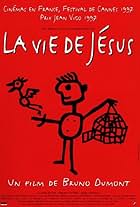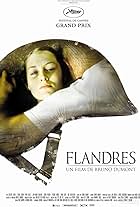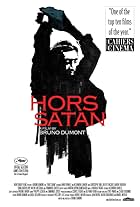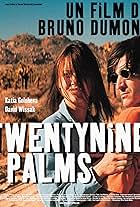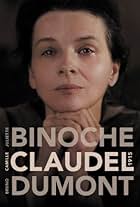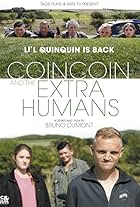When an 11-year-old girl is brutally raped and murdered in a quiet French village, a police detective who has forgotten how to feel emotions--because of the death of his own family in some k... Read allWhen an 11-year-old girl is brutally raped and murdered in a quiet French village, a police detective who has forgotten how to feel emotions--because of the death of his own family in some kind of accident--investigates the crime, which turns out to ask more questionsWhen an 11-year-old girl is brutally raped and murdered in a quiet French village, a police detective who has forgotten how to feel emotions--because of the death of his own family in some kind of accident--investigates the crime, which turns out to ask more questions
- Awards
- 3 wins & 3 nominations total
- L'infirmier
- (as Daniel Leroux)
- Le policier anglais
- (as Robert Bunzl)
- Director
- Writer
- All cast & crew
- Production, box office & more at IMDbPro
Featured reviews
I agree with others who've posted here, this isn't a film for everyone. But if you are moved by the deep existential reflection and quiet, sensitive behavior of a person who can empathize out of his/her own pain, I would recommend this movie.
Dumont makes his bleak, desolate vision obvious right from the start, with the horrendous discovery of a murdered and mutilated child left naked and bleeding in a stark, autumnal field. The image is both shocking and brutal; with Dumont giving us a punch to the stomach right from the very first frame with a lingering close-up of the wound and filleted body parts. It's an image that both establishes and surmises the film as a thematic whole; the loss of innocence being central both with the murder of the child and with the character of Pharaon himself. It is the idea of back-story and the fragile demeanour of Pharaon - and to an extent the evocative performance of non-professional actor Emmanuel Schotte - which anchors the film, giving the audience an emotional spectator. He is also our representation within the film, mirroring the feelings of the audience if not quite our actions. After the aforementioned discovery there are no macho heroics; Pharaon reacts on an emotional level unseen in films of this nature, running back to his car, tears streaming down his face, lost in a kind of detached melancholy that continues throughout the film.
Over the course of the film, the narrative continues to unfold at a slow and deliberate pace, though we quickly realise that the real detective story at hand is not necessarily about the murder of the child, but more importantly, what has happened to make Pharaon the way he is. Has Pharaon had some sinister part in all of this, or is he merely a constant observer. The idea of voyeurism is an important one in Dumont's work, with the camera rarely moving; always static, removed from the context of the scene and merely recording things for our benefit. This gives the film a greater degree of realism, though may be a little tiresome for viewers weaned on a more westernised approach to cinema, with one hypnotic scene in particular finding our central protagonist tending his allotment for what seems like the best part of fifteen minutes.
As the film continues to unfold, and the clues begin to add up, we realise that this isn't going to have a clear-cut, moralistic ending akin to a routine police/crime thriller. Then again, with a central character who lives at home with a controlling mother, who adores the woman who lives down the street and allows her boyfriend to belittle him at every available opportunity and often stands monosyllabic at the back of a room... how on earth could it? With L'Humanité (1999), Dumont has attempted to create a stripped down, bare-naked form of ambient cinema, in which it is the little character details and passages of silence, broken only by shocking violence and mechanical sex, that go towards creating the story.
The ending of the film continues in this same vein and acts as a sort of shocking epiphany, in which every action and subtle line of dialog that has occurred during the epic running time is suddenly given a whole new meaning. Dumont has proved with this, his second feature, that he can reach beyond the tiresome kitchen sink theatrics of his first film, La Vie de Jesus (1997) and incorporate distancing naturalistic techniques (no camera movements, no artificial light, non-professional actors, etc) to create a film that is both horrendous and intoxicating in equal measures. Though enjoy is certainly the wrong word to use with a film this bleak and confrontational, those amongst you who admire the work of forward thinking European auteurs like the aforementioned Michael Haneke, Gaspar Noé and Lars von Trier will certainly admire and appreciate Dumont's shattering tour-de-force.
Pharaon is a slow-witted police superintendent who is anything but pharaonic. He had a girlfriend and a baby, now dead. (We are not told how.) He is friends with Domino, a big-boned, sensitive, slatternly woman next door, and Joseph, her handsome beau, with whom she seems to never stop having sex. In their small town, a little girl has been raped and murdered. Pharaon pursues this case, as he pursues a sort of inarticulate love for Domino. Along the way, a light dawns in Pharaon--a dreadful light. He becomes sensitive to the suffering of all living things--a pig hurt by the suckling of her young, all the way to a motorist getting a beating outside police headquarters. The effect this has is to create a kind of moral schizophrenia in Pharaon: he can filter out nothing. Like an overlap of Raskolnikov and Prince Mishkin, Pharaon takes both the world's sin and sufferings on his back.
But this gives only the barest outline of the experience of L'HUMANITE, which is not about its plot. Indeed, the relationship of Dumont's handling of the materials of cinema to the story itself is unique in my experience of narrative moviemaking. Like Abbas Kiarostami in his recent work, Dumont uses the landscape not to illustrate the story, but to propose a dialectic against it. Where the landscape acts as an argument for life in Kiarostami's TASTE OF CHERRY, here it does something else. It vibrates with feeling. In its childlike gaze at the hardness of people and things, L'HUMANITE tries to get at the shifting feelings underneath--the emotions and sensations so elusive there are no words for them. The movie proves that literary means--finding names--are unnecessary. Dumont finds aural-visual-rhythmic means to voice those emotions.
His techniques can be daring, appalling. Pharaon, gradually overwhelmed by the world's thousand and one cruelties, starts to spontaneously embrace (relative) total strangers, in scenes one can imagine giving audiences giggles. Dumont doesn't care.
L'HUMANITE is the kind of movie that, while you're watching it, you feel can drive you crazy in places, but which you know you'll live with and re-play in your head for the rest of your life. And Cannes naysayers to the contrary, all the performances in this movie--all of them, down to the tiniest--are perfect.
A note: I would like to thank the other people who wrote about L'HUMANITE on IMDB. With no other movie have I felt I learned so much by reading other people's responses, and particularly noting the details they chose to underline. For the authenticity and unabashedness of everyone's responses, I am truly grateful.
In L'Humanite, by Bruno Dumont (La Vie de Jesus), Pharaon de Winter (Emmanuel Schotte) is a Police Superintendent called upon to investigate the murder and rape of an 11-year old girl. Flaunting almost every cinematic convention, the film is not about solving a crime but a 2 1/2-hour poem of mood, time, silence and spirit. Set in northern France in the director's hometown of Bailleul, the characters are unglamorous members of the working class. Dumont devotes long stretches of the film to simply observing Pharaon going about his life: eating an apple, tending his garden, watching a soccer game on television, interacting with his mother, or being a friend to his neighbor Domino (Severine Caneele), a rugged factory worker and her obnoxious bus-driver boyfriend Joseph (Philippe Tullier). He is an unlikely cop, a passive, stoop-shouldered, and empathetic man who would sooner kiss a prisoner on the lips or stroke his neck as browbeat him. Pharaon sees the suffering of the world and wants to hold it in his hands and stroke it. Schotte's performance is so expressive that his best actor award at Cannes was criticized because most people thought he wasn't acting, just being himself.
As the film opens, a man is walking in the distance alone across a grassy hill. Suddenly as the camera moves in for a close-up, he collapses in the mud and just lays there for a while. Is he dead or alive? Did he commit the crime? In the next scene, he is sitting in his car listening to harpsichord music and we discover that he is a policeman talking in a barely audible voice to his superior. The film cuts away to the battered body of an 11-year old girl, her torn and bloody vagina graphically shown as the police gather. Pharaon maintains the same anguished, enigmatic look on his face throughout that makes us uncertain if he is the murderer or the Second Coming of Christ. We know very little about him except that he "lost" his wife and child a few years ago, but it is never made clear whether he lost them or they lost him. Signs of passion or involvement are rare but come with a sudden ferocity, as when he is walking across the crime scene and starts to scream at the top of his lungs, a sound drowned out only by the passing Eurostar train.
L'Humanite is an involving and disturbing film that you cannot feel lukewarm about. It is profoundly moving but often agonizingly slow and virtually unwatchable in some of its graphic details (you may never want to have sex again after watching these mechanical exercises). The climax of the film is as perplexing as the beginning with an ambiguous resolution that I'm not quite sure what to make of. What I do know is that I felt as vitally alive watching this film as I did the first time that I saw Leolo by Jean-Claude Lauzon. L'Humanite is a breath of fresh air on the turgid cinema landscape and Dumont is as honest and challenging a director as I've seen in quite a long time. His film continually forces us to question what we are looking at and, as the title suggests, keeps bringing us closer and closer to the core of what makes us truly human.
For example, we are told Pharaon's girlfriend and child left him, but not why. Is Pharaon's sensitivity a product of his being abandoned by this woman, or was his sensitivity the cause of her leaving? Domino is clearly upset when Pharaon mentions the case of the rape/murder of the young girl, but is her reaction just empathy, or something deeper? For every detail we are given, there are often unresolved questions that are never conveniently answered.
It somewhat reminds me of a Shohei Imamrua film, like Vengeance is Mine or The Eel, in that the story unfolds through rather mundane scenes, but these scenes end up speaking volumes over the course of the film. You could also say it is a bit like Antonioni as well, as the ordinary, often bright, landscape often contributes just as much emotion as the characters. Basically, Brumo Dumont, like Imamura or Antonioni, eschews normal narrative conventions to tell a story. He lets the viewer fill in the gaps, and much of the film will always remain an engaging mystery.
Did you know
- TriviaThe body of the raped little girl was a silicone cast.
- Quotes
[first lines]
l'inspecteur de police Pharaon De Winter: I'm coming.
- Alternate versionsItalian distributor BIM originally removed about 2 minutes of sex footage from the Italian theatrical release in order to avoid a 'not under 18' rating. When the press criticized this self-censorship attempt, the distributor reissued the film in its original, integral form.
- ConnectionsFeatured in Siskel & Ebert: Instinct/The Loss of Sexual Innocence/Limbo (1999)
- SoundtracksLe Vertigo, Rondeau. Modérément
from "Pièce de Clavecin"
Music by Pancrace Royer
Performed by William Christie
Courtesy of harmonia mundi
- How long is Humanité?Powered by Alexa
Details
- Release date
- Country of origin
- Official sites
- Languages
- Also known as
- Humanity
- Filming locations
- Bailleul, Nord, France(Village)
- Production companies
- See more company credits at IMDbPro
Box office
- Gross US & Canada
- $113,495
- Opening weekend US & Canada
- $10,075
- Jun 18, 2000
- Runtime2 hours 21 minutes
- Color
- Sound mix
- Aspect ratio
- 2.35 : 1
Contribute to this page










